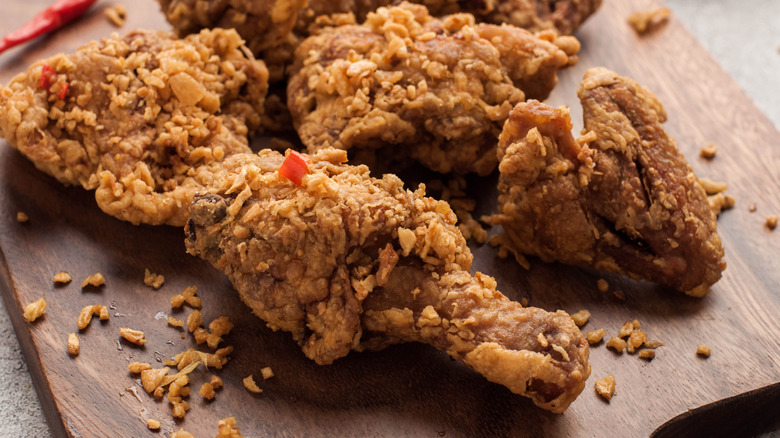The Best Oil To Use When Making Fried Chicken
Who doesn't love delicious, crispy fried chicken? Making it at home with good results requires some finesse, especially when it comes to the frying process. For expert advice on achieving perfectly golden fried chicken, Food Republic consulted Lance Knowling, executive chef of Northridge Restaurant at the Woolverton Inn, who shared his insights on selecting the best oil for frying.
"Vegetable oil is the most cost-effective oil because of its high smoke point and a neutral flavor," chef Knowling shared. An oil's smoke point — the temperature at which its compounds begin to break down, causing it to burn and smoke — is an important consideration. Exceeding this point not only affects the flavor of the food you're frying, but can also be hazardous, both in terms of consuming burnt oil and the increased risk of flammability.
For frying chicken, chef Knowling also endorses soybean oil as a good alternative. But, if you really want to splurge, you can opt for tallow, which is rendered animal fat chefs commonly use for frying. Knowling praises this as a superior option, because is has both a high smoke point and lends deep flavor to your chicken. "It's a little more expensive and is actually healthier than many oils," he explained, "but if you're not frying a lot of chicken at once, it's not worth it — you'd be better off just using a flavorless oil with a high smoke point."
Oils to avoid when frying chicken
However, a high smoke point isn't the only factor to consider. You should avoid using olive oil when making fried chicken, as well as other common but pricey cooking oils like avocado — even if they have high smoke points. "There's no need to waste money frying in these more expensive oils when other options exist!" Lance Knowling advised.
"You [also] want to avoid unrefined oils or very flavorful oils for frying, like hazelnut or walnut for example," Knowling said. "These oils are best for finishing dishes and dressings ... not frying."
While unrefined oils contain beneficial nutrients, they tend to spoil more quickly and burn more easily, making them better suited for low-temperature cooking rather than high-temperature frying. Unrefined walnut oil, while deliciously flavorful, will become bitter very quickly if heated. Additionally, a strongly flavored oil can overpower the taste of your chicken, whereas a neutral oil allows the seasoning and crust to shine.


